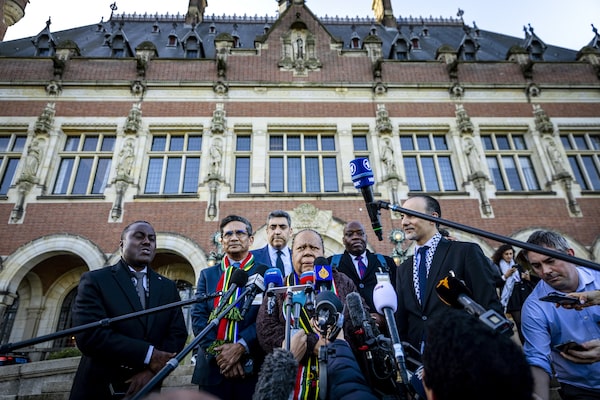
South African Foreign Minister Naledi Pandor speaks to the media following a ruling by the International Court of Justice on a request from South Africa for emergency measures for Gaza, in The Hague on Jan. 26.REMKO DE WAAL/Getty Images
On the eve of the world court’s historic ruling on Israel last week, South African foreign minister Naledi Pandor made a friendly visit to another judicial body in The Hague: the International Criminal Court.
Ms. Pandor smiled cheerfully as she met the ICC’s top officials in their offices. Her visit was a remarkable reversal of tone by a senior minister in South Africa’s government – which was still threatening to abandon the ICC as recently as last year.
After winning a series of powerful orders against Israel at the International Court of Justice (ICJ) in The Hague last week, South Africa has been hailed as a hero in much of the world. Its leaders have been praised across Africa and in many corners of the Middle East and elsewhere, including by human-rights activists in Canada.
But for nearly a decade, South Africa had a much more tangled history with the institutions of international justice. It refused to enforce an ICC arrest warrant against Sudan’s former dictator, Omar al-Bashir, when he visited the country in 2015. It was reluctant to enforce a similar arrest warrant against Russian President Vladimir Putin when he planned to visit last year. And it tried multiple times to quit the ICC after the Sudan case led to heavy legal pressure against it.
South Africa’s ruling party, the African National Congress, has long been critical of the ICC, accusing it of bias against Africa. The government has twice introduced parliamentary bills to withdraw from the court. The latest bill stayed on the books officially until last March.
South African President Cyril Ramaphosa gave a glimpse into this ambivalent stand last April when he told a press conference that the ANC had decided it would be “prudent” to quit the ICC because of its “unfair treatment” of some countries. A top official in the ruling party confirmed the decision. But a few hours later, the party and the President reversed the decision, announcing instead that a withdrawal from the court would be “a measure of last resort.”
The contradictions in its ICC stand seemed to result from South Africa’s close relationship with Russia and other countries in the BRICS partnership (Brazil, Russia, India, China and South Africa). The ANC was critical of the Putin arrest warrant, and the government made a failed effort to persuade the ICC that Mr. Putin should get diplomatic immunity for his planned visit to a BRICS summit in Johannesburg last August.
But the resentment over the ICC’s alleged biases seemed to vanish after October when the Israel-Hamas war erupted. South Africa swiftly accused Israel of violating international law in Gaza, and by November it had joined four other countries in asking the ICC’s prosecutor to investigate Israeli leaders for alleged war crimes in Gaza.
In many ways, South Africa’s recent rapprochement with the ICC is a return to its original stand in the mid-1990s. After the election of Nelson Mandela as the country’s first democratic president, South Africa was a strong supporter of the court. It was only under its later president, Jacob Zuma, who faced criminal cases and corruption scandals throughout his presidency, that the government turned against the court.
A few weeks after its ICC referral against Israel in November, the government pursued a separate case at another judicial body: the International Court of Justice (ICJ), the highest court under the United Nations system, where South Africa alleged that Israel was violating its legal obligations to prevent genocide in Gaza.
South Africa’s case at the world court this month was boosted by the expertise that its vibrant human-rights sector had developed in the earlier ICC cases. A key member of its legal team in the genocide case was Max du Plessis, a lawyer who had worked to uphold South Africa’s obligations to arrest both Mr. al-Bashir and Mr. Putin under the ICC warrants. He had helped a human-rights litigation centre to win its case against the South African government on the arrest warrant for Mr. al-Bashir, and he later acted for an opposition party to seek enforcement of the Putin warrant.
South Africa’s circuitous journey to last week’s court ruling has exposed some of the inconsistencies in its foreign policy, analysts say. In addition to its refusal to fulfill its legal obligations in the Sudan case, the government has been reluctant to criticize the Russian invasion of Ukraine, has ignored human-rights abuses by other BRICS partners such as China and India, and was slow to condemn the Oct. 7 attack on Israel by the Hamas militant group.
“Pretoria’s glaring foreign policy contradictions and inconsistencies cannot be ignored, especially if the government believes this ICJ case may help the country rekindle its moral authority on the world stage,” two analysts at the Africa-based Institute for Security Studies wrote last week.
The analysts, Ronak Gopaldas and Priyal Singh, said South Africa should be applauded for working with legitimate legal instruments in its support for the Palestinian cause. But they added: “There are many cases where international law violations and abuses of power by other states haven’t received a similar reaction from Pretoria.”
Zane Dangor, the top bureaucrat in South Africa’s international relations department, acknowledged recently that South Africa is seen as inconsistent in its messaging on Ukraine and Gaza. He said he has faced questions about “why South Africa is so clear in its support for the people of Palestine and not for the people of Ukraine.” The government “could have been clearer in many aspects of our response to the war in Ukraine,” he wrote in a South African media outlet.
 Geoffrey York
Geoffrey York